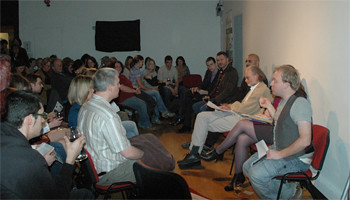This is an open thread for your thoughts on the Cardiff sciSCREEN screening of The Hurt Locker at Chapter Arts Centre. What did you think about the film itself, and about the issues raised during the audience/panel discussion that followed?
Subscribe to:
Post Comments (Atom)








I really enjoyed the film although I thought I wouldn't, Im not into glorifying war or blood and guts! It made me think a lot both in the discussion and later. For me the film was about humanness,fragility,and expectations of each other. The situation portrayed was so extreme, it demanded something other than 'normal' social rationales be applied. It was a matter of survival,'the rules' didn't help much. I doubt that situation leaves anyone 'normal' after a short time, it showed the brutality of war and its effect on people trying to survive. Why do we expect people to be unchanged and 'fit in' to society after such events? I thought it was interesting that the first guy who got killed early in the film was cautious and was trusted by his team, but got killed due to the cautiousness of his team buddies in not shooting the man with the mobile phone. The more challenging character gave his team nightmares, but when it came to the crunch he performed well. The Psych who got killed had misplaced his trust, and paid with his life. It seems luck had a part to play. There was no right/wrong, safe/unsafe, just decisions to be made at the time. James' character did show attachment feelings to the young Iraqi boy,and the man who was the human bomb,but was unable to cope with loving his own family. Perhaps that was too painful and he needed limits. Also wondered if the blood on the hands, shower thing, was a bit of a Macbeth metaphor?
ReplyDeleteI thought it was a really interesting idea to have Lt Felix Carman at the screening and I also enjoyed the contributions from Tracie, David and Jonathan. My problem with the discussion from some other quarters was that it was neither film specific enough (Tracie touched on how this war film was different from others) or mental health specific enough (I would have liked to develop the discussion about the differences between alchoholism and PDST and how they are treated)
ReplyDeleteIf the discussion gets caught up with a assumption (which the film works very hard to achieve) that the story has some approximation to the truth of war, or the effect of war then it all gets a little tedious because of course it has absolutly no approximation to any truth except narrative truth and generic war films truth. It's a story, told within specific conventions.
If watching the film with an audience encourages the medical profession to be more open about how they treat war veterans or war veterans to speak more openly about their experiences of war (or therapy)then the screening has achieved some useful objectives. But a film expert can help us to understand how stories of war are constructed in the film industries and why - that too would be a useful outcome.
Whether the characters in the story can be diagnosed or judged (good/bad/heroic) is a trick of film narrative. They don't think or feel anything but we as the audience do and it is the feelings and thoughts that we have about the experience of watching the film that can be assisted and illuminated by understanding its mechanisms. In this respect I agreed with David that the film is much more interesting in what it tells us about us than what it tells us about war. I disagree with him about whether more context would give us more truth or politically responsible reporting of war.
In the two previous Sciscreen events the presence of film specific comment from the panel helped damp down the appeal to 'reality' which I thought made the debate more interesting and revealed more about the psychiatry professional's bafflement about why they are represented in the way that they are within different generic conventions.
I am really enjoying the whole series
I agree with the comment by Fizzy that the discussion did not explore the mental health issues enough (which I felt was the strength of the panel/discussion following the previous screening 'Wolfman')
ReplyDeleteJohn Weber, the philosopher of moral psychology on the panel said... "It's not really about courage and cowardice but about being able to assess the danger you are in and putting it into perspective"
I imagine that people who come back from war (or rather those who have experienced quite harrowing situations at war) find the context within which they are having to make decisions has changed. I thought the reference in the film to choosing breakfast cereal was simultaneously cliched and poignant. Their point of reference has surely shifted and it must be hard to re-allign their sense of perspective. It would have been good to have more of a discussion about such difficulties and their impact on mental health.
But then, that's what the blog is intended to do - further the discussion! So many people wanted to make points that there wasn't enough time to cover it during the evening itself.
Looking forward to the next one!